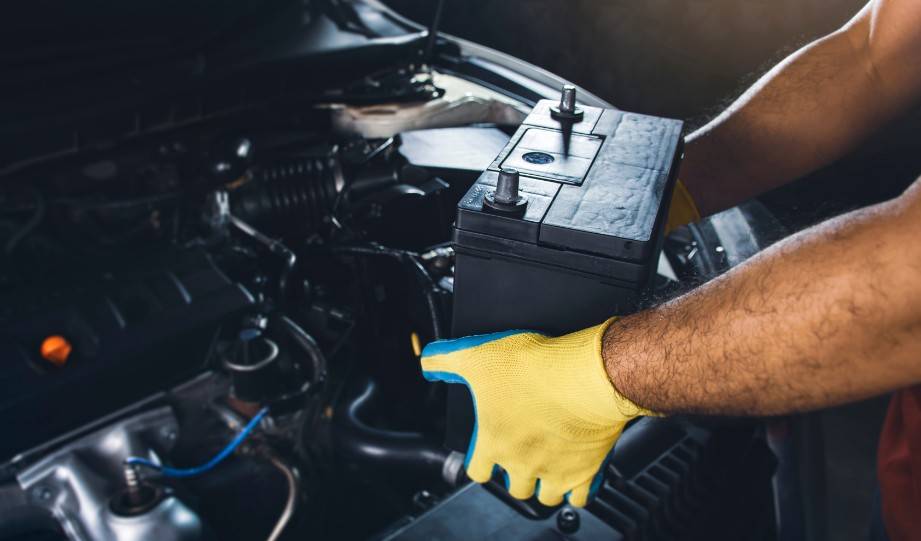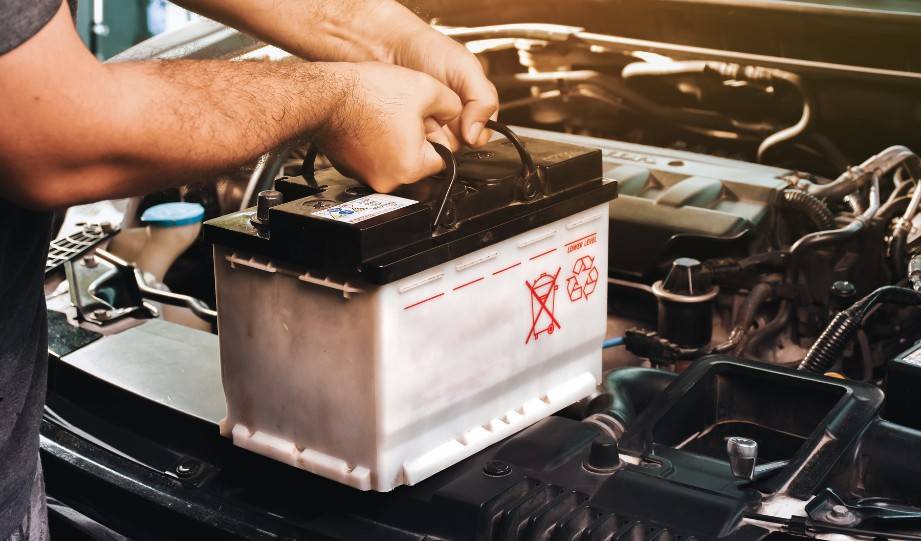Car batteries have always been a waste management problem, but between environmental laws and better recycling processes, it has never been easier to make sure that car battery materials are properly recycled.
The question is, though, where do you start?
So, I’ve put together this complete guide to help you better understand all your options and what you should do to prepare all the dead batteries you might have.
Let’s get right to some solutions.
Note: GreenCitizen cannot currently accept any loose batteries not installed in electronics due to hazards associated with handling and storage.
How Do I Dispose of a Car Battery?
1. Take It to a Recycling Center
If you have already removed used batteries, then the best thing you can do is search for recycling centers near you. The fastest way to do that is to use our Green Directory.
Simply enter “car batteries” and your zip code, and you’ll find a direct recycling center close to you.
2. Contact Your Municipal Waste Center
Many municipal waste centers are set up to deal with all types of common household waste that may contain toxic materials. If you have such a center close by, then give them a call to see if they accept car batteries.
3. Bring It to an Auto Parts Shop
Here’s something that many people don’t realize. When you go to an auto parts store to purchase new batteries, they will generally accept the old battery at no extra cost or even for a store voucher.
It’s the easiest way if you’re going to replace the car battery yourself.
4. Sell It to a Scrap Metal Dealer
Unlike many other types of rechargeable batteries, scrap metal dealers often look for car batteries as a source of new raw materials.
Metal dealers usually extract the cathode metals of spent batteries, and they often sell these to the battery manufacturing industry.
5. Return It to the Retailer
Some U.S. states have introduced “extended producer responsibility regulations” like the European Union. This means that manufacturers and retailers have to offer a recycling process for regular car batteries as well as electric vehicle lithium-ion battery cells.
6. Have It Replaced by a Certified Mechanic
If you’re not the type of DIY person when it comes to fixing a car, then a local certified mechanic will be able to replace battery systems and take care of the old battery components for you. They will likely have direct recycling methods and contracts with the manufacturers.
7. Take It to a Battery Collection Event
If you have some old car batteries in your garage, then one option is to keep an eye on any local environmental events taking place.
Look for local advertisements as such events often include a battery collection point that makes sure the battery metals get to the right recycling companies.
Car batteries shouldn’t be thrown in the trash because toxic materials that are contained in them are highly corrosive and can do extensive damage to the environment.
How To Prepare Your Car Battery for Recycling
There are two parts to removing and transporting a car battery that you have to carefully plan for.
Part 1: Safely Remove the Car Battery
- The correct way to remove car batteries is to disconnect the negative terminal first and then the positive one.
- Make sure that your wrench never touches both terminals at the same time for safety reasons.
- Check if there are any clamps that hold the battery in place and remove those.
- Carefully lift the battery out. Be aware that they are heavy to lift.
Part 2: Properly Store and Transport It
- Carefully inspect the battery for any visible external damage. Cracks or punctures make storing and transporting car batteries a lot more dangerous.
- Place the car battery in a plastic bag to insulate it, because even a dead battery can store electricity.
- Make sure you store and transport car batteries in an upright position at all times, as the acid inside could leak.
- Bring it to your preferred recycling option from the above list.
Car Battery Recycling Process
There are only a few steps involved to break down an old car battery. But due to the toxic materials, this is a carefully controlled and regulated process.
Step 1
The first thing that happens is that recycling facilities carefully remove any remaining battery acid. This liquid is then neutralized and treated for safe disposal.
Step 2
Next, the outer plastic shell and any other plastic internal components are separated from the metal components. These are all valuable parts that can be used to make new batteries.
Step 3
Most of the valuable metals come in the form of lead, nickel, and cobalt, and a smelting process separates these out. It’s an energy-intensive process, but it avoids an even more energy-intensive and environmentally damaging process in the mining industry.
Step 4
The separated recycled materials go to a battery manufacturing plant, where they make up about 80% of new batteries.
Why You Shouldn’t Throw Car Batteries in the Trash

Car batteries shouldn’t be thrown in the trash because toxic materials that are contained in them — such as lead and battery acid — are highly corrosive and can do extensive damage to the environment, humans, and animals.
When released, these chemicals can cause breathing problems and worsen global warming.
Also, when any type of battery is stored or disposed of in an incorrect way, then excessive heat can cause them to explode and cause a fire.
What About EV Battery Recycling?
Industry analysts predict that the number of electric vehicles on U.S. roads will grow to over 140 million in the next ten years in what is called the EV revolution.
While the increased demand for EV lithium-ion batteries is instrumental in reducing carbon dioxide tailpipe emissions and impacting climate change, recycling EV batteries at such a scale to create a circular economy for the industry is still a problem to be solved.
Why?
For you to understand it, let’s take a look at the components of EV batteries and how they are recycled.
The critical materials in electric cars — say, a Tesla Model S — reside in lithium-ion battery packs that have a very similar design to what’s in your phone, tablet, or computer, just on a larger scale.
Those packs are composed of several modules, which are then made up of cells that have a graphite anode and a cathode sheet inside them. The cathode sheet is the primary target of recyclers since it’s predominantly made out of valuable materials like cobalt and nickel.
Those materials are recycled using two techniques: pyrometallurgy and hydrometallurgy.
Pyrometallurgy involves shredding and burning the cells and other components of the battery, while hydrometallurgy dissolves them in acid.
The problem with both methods is that they produce a lot of waste and emit a lot of greenhouse gases, making them unsustainable in the long run.
Because of the rapid growth in the EV market, it’s clear that new technology will need to solve the growing battery supply in years to come.
Ideally, that will involve some process that would keep the cathode metal mixture intact (a process called direct recycling) as it would reduce the amount of processing and energy expenditure when creating new EV batteries.
In direct recycling, workers would first vacuum away the electrolyte and shred battery cells. Then, they would remove binders with heat or solvents, and use a flotation technique to separate anode and cathode materials. At this point, the cathode material resembles baby powder.
— Ian Morse, Journalist at ScienceMag.com
Frequently Asked Questions (FAQ)
Yes, AutoZone gives you money for old batteries in the form of gift cards and vouchers. It’s an easy way to make that trip for battery recycling worth your while.
Yes, some Walmart stores give you money for old batteries in the form of a core charge refund. Those are charges imposed when you bought the old battery, and it’s a key strategy of their battery recycling program.
Yes, O’Reilly Auto Parts gives you money for old batteries in the form of a $10 gift card. It’s a quick way to make some money on old car batteries.
Conclusion
With all the above information, you should have a clear picture now of how to best dispose of any old car batteries you have.
There should be no reason for such batteries to end up at a landfill and cause further damage to the environment, so you should take on the responsibility of recycling them properly. The easiest way to do that is to use our Green Directory.


